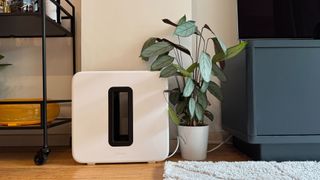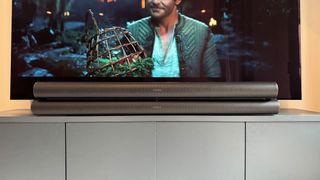The new Sonos Arc Ultra soundbar sounds fantastic, but I’m far more impressed by its smart features
When the Sonos Arc Ultra soundbar and Sub 4 were finally unveiled, all eyes (or should that be, ears?) were focused on whether they sounded better than their predecessors, and by how much.
As our full Sonos Arc Ultra review reveals, it’s “the best one-box Dolby Atmos soundbar for the price.” It’s not without its immediate flaws, namely maintaining a single HDMI input (yep, Sonos still refuses to offer HDMI passthrough) and there’s no support for DTS, although with the majority of spatial audio movie soundtracks being available in Dolby Atmos, this shouldn’t alienate too many potential customers.
I wholeheartedly agree with the statements made by my colleague Matt Bolton in our full Arc Ultra review, but having spent some time with both the Arc Ultra and Sub 4 – which have temporarily replaced my Arc and Sub 3 at home for testing – I’ve discovered a few extra little features that, combined with the stellar sound output, have me reaching for my credit card to upgrade.
The Sonos diet
When we first spied leaked photos of the Sonos Arc Ultra soundbar, it was tricky to determine if there was any change at all to the design compared to the Arc. In reality, there certainly isn’t much to separate them, and the Ultra is still unmistakably Sonos. The only difference is that the new soundbar is slightly longer but also – crucially for me – marginally shorter in height. Official dimensions are 87 x 1142 x 116 mm for the Arc and 75 x 1178 x 111 mm for the Arc Ultra.
The biggest impact the Sonos diet has had for me is that the soundbar now doesn’t cut off the bottom of my LG G4 OLED. My previous Arc didn’t block the bottom of the screen massively, but I often found my eyes being drawn to it more than I would like. Now, with the Arc Ultra in its place, I can clearly see the bottom of the screen and I’ve found I’m immersed in the action on the screen a lot more, as the ‘floating screen’ effect of the G4 OLED is more prominent.
The change in depth is also another bonus for me. The LG G4’s stand, plus the fact the TV naturally sits at a slight angle (I have the 77-inch version – the 65- and 55-inch models stand flat) meant there wasn’t an awful lot of space for my old Arc to sit on the approximately 40cm deep stand. While the Arc Ultra is ‘only’ six millimeters skinnier, it has made a huge difference on my media unit.
Matte attack

Another feature I’ve found to have a subtle but significant impact at home is the new matte finish of the Sub 4. When I first read about it before receiving the test unit Sonos sent me, I was unsure exactly what to expect. I was already quite enamored with the shinier finish of the Sub 3 and I do still think it looks like a premium product.
But when I took the dust bag off the Sonos Sub 4, I let out an “oooh, that’s nice” response. The white matte finish perfectly matches the Era 300 speakers I have for surrounds, and I’m sure it would match a white Arc Ultra (I was sent the black version for this article).
But the surprising effect it had for me was how it blends in more with the white wall it’s placed against. It’s not a monumental change, but when you’re spending the money Sonos asks for the Sub 4, you’re going to want it to look as good as possible, and I think it’s stunning.
As I’ve alluded earlier, I only get to test the Sub 4 – and the Ultra soundbar – for a limited time, and I’ll admittedly be fine going back to the Sub 3 when the new gear has to be returned. If you already own a Sonos sub, I’m not sure it’s worth upgrading just for the matte finish, but ultimately I’m pleased to see Sonos making the design change. And, as our review of the Arc Ultra states, most people may not feel the need to add a subwoofer at all, given how well the soundbar handles low frequencies.
Speech-y clean

OK, so this one is sort of sound related, but not entirely. Along with the new Sound Motion technology used in the woofer, the Sonos Arc Ultra has introduced a new Speech Enhancement feature to boost dialogue. It’s not a revolutionary update where soundbars are concerned – the Sony Bravia Theater Bar 8, for example, calls its version Voice Zoom – but it’s something I was excited to learn of, as I had previously thought the Arc sometimes struggled when it came to voice clarity.
The Speech Enhancement feature is accessed within the Sonos app – which, for the record, I never really had an issue with during SonosAppGate, but can appreciate has now been vastly improved – and works on a scale of Low, Medium or High. You also have the option of turning it off.
When in use, it really works, with dialogue coming through a lot clearer, with a much more obvious notion of a ‘center channel’. Its highest setting comes at the cost of other aspects of soundtracks being softened, such as bass levels, so I’ve personally found low or medium to be the better options, as the rest of a soundtrack remains as it should, just with vocals given a slight boost.
To be honest, the Speech Enhancement feature is the biggest improvement over the Arc in my opinion, and genuinely worth the upgrade.
Long-overdue Bluetooth

Sonos and Bluetooth haven’t always had the most harmonious of relationships. The brand has traditionally been a Wi-Fi-only operator, until it introduced the Sonos Move as its first portable Bluetooth speaker. This was followed by the Roam and Sonos has since given Bluetooth support to its home-based speakers, including the Era 100 and Era 300.
I’ve not always seen the need for Bluetooth in Sonos’ home gear – they’re constantly connected to Wi-Fi and music quality benefits when being streamed via AirPlay or directly from within the Sonos App – but at least Sonos is giving its speakers and soundbars the ability to receive a Bluetooth stream and share it with other compatible speakers. It is a multi-room speaker brand, after all.
To make connectivity that much easier, Sonos has added a dedicated Bluetooth button on the rear of the Arc Ultra. It’s also possible to activate Bluetooth pairing from within the Sonos app. It’s a quick process, and you’ll have music streaming around your home in no time at all.
Final credits
If you already own a Sonos Arc, you may still be wondering if it’s worth upgrading to the Arc Ultra. As with almost everything, that depends on your use case. For myself, I spend a lot of time at home scouring the best streaming services for movies and TV shows to binge on. I also love good sound, and so naturally, I’m going to want the best that’s available to me. I would love a ‘proper’ speaker package and an AV receiver, but I just don’t have the space.
Therefore, in my opinion, the Arc Ultra with Era 300 surround speakers and a Sub is the next best thing. The new Speech Enhancement feature is a huge step up, and fixes perhaps the biggest niggle I had with the original Arc. To me, it’s worth the upgrade, but to you, maybe not.
As for the Sub, if you already have a Sub 3 or older, then I don’t think it’s worth moving up to the Sub 4. I didn’t notice much difference in the bass output. Sonos’ big slab o’ subwoofer has always been a top performer in my experience (and could realistically be too much in some rooms) and I have no complaints with the Sub 3’s performance. Do I prefer the new matte finish? Yes. Is it worth spending $799 / £799 / AU$1,299 just for that finish? No.
If you currently own a full Sonos home theater setup but you want to make the overall soundfield bigger, wider and more powerful, than I’d recommend at least auditioning the Arc Ultra in your local hi-fi or electronics store. Even if you ultimately decide the improvements aren’t big enough to justify an upgrade, I guarantee you won’t be disappointed.


